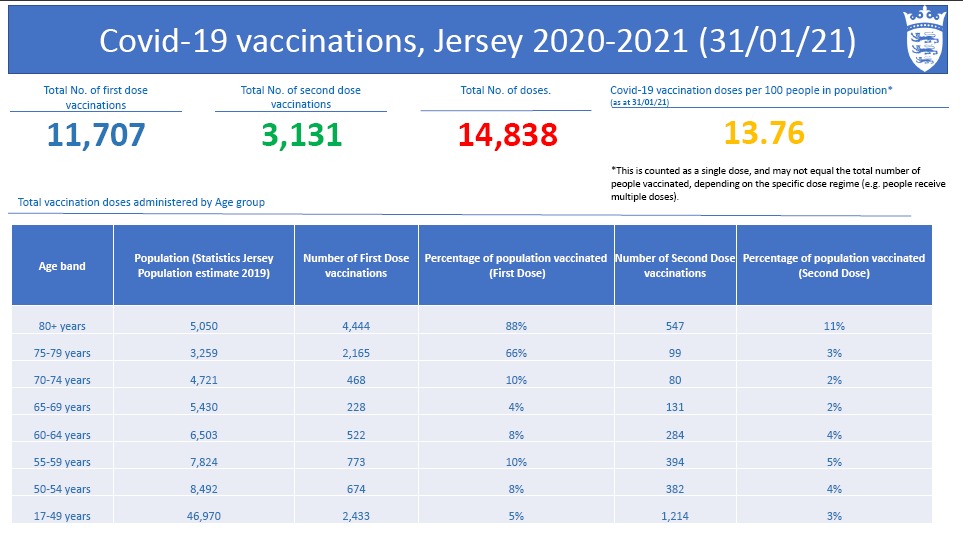Programme lead Becky Sherrington said she was delighted with the progress made so far and revealed that possible reasons why some Islanders might exercise the right to decline the vaccine will be analysed.
All households in Jersey are to be surveyed in an effort to learn more about why some people might decline a coronavirus vaccine, the government has confirmed.
News about the Islandwide survey came as the latest information on vaccination was issued yesterday, alongside confirmation that the so-called UK variant was present in Jersey.
Mrs Sherrington said the survey, expected to be posted out during the next week, would seek general feedback about vaccination as well as reasons for opting out, aiming to ensure future communication was ‘tailored’.
‘We hoped that 80% was a good benchmark to aim at and that high figure was seen with suspicion, but already we are well above that among those at highest risk,’ she said.
The latest figures, which cover the period up to Sunday 31 January, show 89% of the group of around 1,000 care home residents had received a first dose of the vaccine, with 76% having been given their second dose. Among over-80s, 88% had received a first dose.
The focus has now shifted to those in their 70s, as well as around 3,000 Islanders classed as extremely vulnerable.

People in the next tiers of priority: those at risk (but lower than the ‘extremely vulnerable’ group), and Islanders aged 65 to 69, should be able to make their appointments next week.
The ‘at risk’ group includes those with less severe respiratory conditions, Islanders with chronic heart, liver or kidney disease and also covers conditions such as cerebral palsy, diabetes, dementia and epilepsy. A full list is available via the gov.je website.
Jersey’s tally of 13.8 doses of the vaccine administered for every 100 people ranks just below the comparable UK figure on 31 January of 14.4, according to the Our World in Data website, which also records figures for global jurisdictions including Gibraltar (39.4), USA (9.3), the Isle of Man (9) and the European Union (2.9). Guernsey’s weekly update is due to be issued today.
Deputy medical officer of health Dr Ivan Muscat added that although some EU countries had expressed doubt about the effectiveness of the AstraZeneca (Oxford) vaccine among over-65s, Jersey was aligned to the UK’s Joint Committee on Vaccination and Immunisation.
There had been no indication from the UK about the need to restrict certain vaccines to certain age groups, he added, with evidence this week showing that a single AstraZeneca dose had a 76% efficacy rate and reduced transmission by 67%.
Dr Muscat added that the rollout of the vaccination in Jersey should start to put downward pressure on case numbers, although he could not predict exactly when this would take effect. England’s chief medical officer Professor Chris Whitty indicated this week that case numbers could start to fall in two to three weeks. As well as downward pressure from vaccination, Dr Muscat said there was also likely to be ‘upward pressure’ on case numbers as a result of the easing of restrictions.
Officials also urged all Islanders, including those who had received vaccines, to continue to follow guidance about hand hygiene, gatherings and social distancing while the rollout continues.
Mrs Sherrington said Jersey remained on target to have offered a first dose of the vaccine to all over-50s, plus any Islanders aged 16 to 49 deemed to be at high risk, by 29 March.






